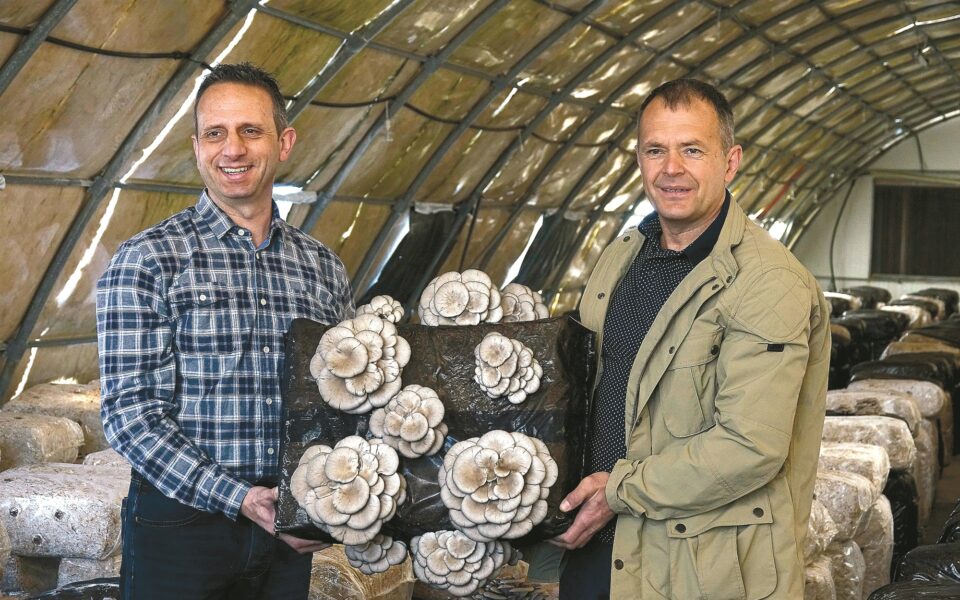Functional food, made in Greece
Two local firms are working on products with added nutritional value

How about a snack that’s just as delicious but way healthier than the usual greasy potato chip when you’re desperate for a quick nibble? Or a glass of milk containing a higher concentration of melatonin instead of a pill when you’re tossing and turning in your bed?
New dietary choices are increasingly becoming part of our lives in the form of so-called “functional foods” that bolster health and well-being – that is foods that are modified to add or reduce a specific component.
“Nutrition is always a priority and a lot of labs have turned to this area in recent years,” says George Zervakis, a professor at the Agricultural University of Athens and head of its Laboratory of Foods Microbiology and Biotechnology. The idea of functional foods began in Japan in 1984 in an effort by the country’s Health Ministry to reduce the cost of care for its rapidly aging population. It started as a system of certification for foods that have been proven to have health benefits and quickly caught on with the innovation-loving Japanese public.
By 2008, it was estimated that nearly 5% of all packaged foods sold in Japan belonged to this category. Proliferation has been slower in Europe, though the trend for healthier eating habits has seen greater momentum in recent years. According to data published in February 2020, the world functional food market came to $267 million in 2019.
The Agricultural University of Athens’ Laboratory of Foods Microbiology and Biotechnology has been studying fungi for many years, and especially mushrooms, which, the scientists have ascertained, contain numerous bioactive compounds that have, among other properties, an effect on human health.
“We can get a lot of ingredients for making valuable products from mushrooms. Ingredients that could be used as nutritional supplements or to produce environmentally friendly cosmetics. They have enzymes that can break down pollution. Mushrooms can be used to produce animal feed and for new-generation products to protect plants,” says Professor Zervakis. Above all, though, mushrooms have unique properties benefiting human health. They contain vitamin D – and are, in fact, the only non-animal product to have this essential vitamin for breaking down fat – they have polysaccharides that are good for gut health and they have antioxidants.
The American Farm School’s new product is milk from cows milked only at night and therefore contains more melatonin
Farm to lab
Over in Evia, many kilometers away from the well-equipped lab of the Aristotle University of Thessaloniki, agronomist and mycologist Lefteris Lachouvaris (of the Dirfis Mushrooms company, which exports 60% of its output to Israel) had spent years looking for a way to sell mushrooms that made them easier to eat. “We wanted to get the mushroom to consumers without them having to cook it. But we also wanted this way to be as healthy as possible so as to maximize the effects of the mushroom’s good properties,” he tells Kathimerini. Working with a German lab in 2017, he knew that mushrooms contain ergosterol, which turns into vitamin D when it is exposed to sunlight. He laughs as he remembers laying hundreds of mushrooms out in the sun, in different sizes and conditions, in order to study them. Dirfis worked with the Aristotle University for around four years on a new product that has almost miraculous qualities: a snack chip made of oyster mushrooms that has not been launched on the market yet and, as such, has not been given a commercial name.
The new product was put through clinical trials headed by Andriana Kaliora, an assistant professor of foods and human nutrition at Athens’ Harokopio University. They revealed that 6 grams of mushroom chips a day increases vitamin D levels in the blood, decreases glucose, and helps with inflammations and gut health. Equally importantly, they gave consumers a sense of being full. But for the people behind this new product, “one of the most important things in any foodstuff is the flavor,” stresses Zervakis.
Independent testers reported “excellent flavor qualities, without any downsides” and commented on the fact that the chips have no added salt or sugar. The product will be headed to expert nutritionists in September as, for the time being at least, its production on a large scale is still not possible.
Night milking
The American Farm School’s new product came about almost by accident, notes Dr Theodoros Kallitsis, a veterinarian who also heads the educational farm in Thessaloniki. “We recorded how the cows sleep, when they rest, when they eat and other things as part of a program for their well-being,” he says.
“The animals were much calmer at night, so it makes sense that livestock farmers tend to milk them after nightfall,” explains Georgios Arsenos, a professor of veterinary medicine at the Aristotle University and head of its Animal Husbandry Lab, which works with the American Farm School. Analysis of the evening milk conducted between December 2019 and January 2021 confirmed what scientists had suspected: that it contained 25% more melatonin than milk collected during the day.
“Melatonin is a natural substance that is found in every living organism and is important in regulating the circadian rhythms of several body functions,” says Arsenos.
Melatonin helps synchronize the sleep-wake cycle with night and day through a mechanism that tells the body when to relax. The American Farm School’s new product is milk from cows milked only at night and therefore contains more melatonin. It has been aptly named Vradino, or “Nighttime.”





